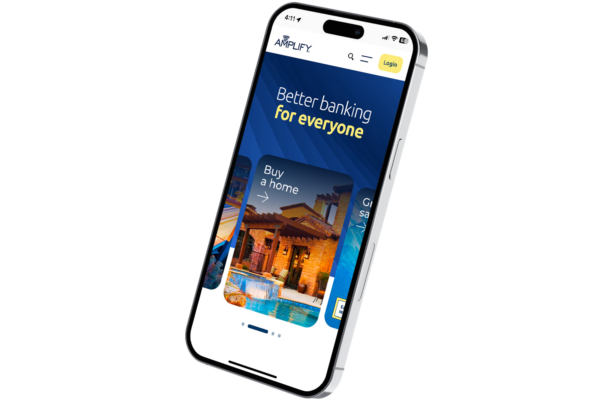First-Time Homebuyer Down Payment
Down payment amounts can vary quite a bit depending on the type of mortgage you’d like to qualify for. You don’t necessarily need to put down 20%–read on to discover how to use a different amount for your down payment.
In 2019, over a quarter of first-time homebuyers cited saving for a down payment as the most difficult task in the homebuying process. And for good reason— coming up a large chunk of money isn’t always an easy task, especially when you aren’t sure exactly how much you’ll need when it comes time to buy. But do you know exactly how much of a down payment you’ll be required to make? It may be far less than 20%!
Looking for your first mortgage? Apply today!
Amplify’s experienced Real Estate Team is ready to help you find a great home loan.

What is a down payment?
A down payment is a lump sum of money paid toward your mortgage, typically paid on the day you officially close on your home. This is separate from closing costs, which cover origination fees and other expenses.
How much is a typical down payment on a house?
Down payment amounts are different with every mortgage, but they are always based on a percentage of your home’s value. This percentage can vary widely. While down payments are commonly talked about as being 20% or more of your home’s value, a 2020 report from the National Association of REALTORS showed that the average down payment was just 6% for first-time buyers in 2019.
The idea that a down payment has to be 20% is a common misconception. Each lender and loan type has its own preference for the down payment amount, and each mortgage is different. While you can estimate your down payment, talking to an experienced lender is the best way to get a solid idea of what your down payment will actually be.
How much is a “good” down payment?
It’s important to keep in mind that the amount of your down payment affects more than just the total amount of your mortgage. The amount of your down payment influences three things:
- Your loan type: Your lender will work with you to explore loan types and options. Depending on your loan type and amount, they will also tell you exactly how much your down payment must be to qualify for the loan. If you don’t have the funds, you will not be approved for that specific loan.
- Your mortgage interest rates: How much you put down does affect your interest rates. Typically, the more you put down, the better rate a lender will offer you.
- How much interest you pay over the course of the loan: A larger down payment means a lower rate and a smaller mortgage principal balance. This lessens the amount of interest you pay in total over the life of the loan.
- Whether or not you have to purchase private mortgage insurance (PMI): Most loan types require PMI if a borrower puts down less than 20% (this can vary per loan type; for instance, VA loans don’t require PMI). PMI protects lenders against financial loss if you default on your loan.
If you have the liquid cash, a healthy emergency fund, a robust retirement fund, and are otherwise financially stable, putting down 20% or more can be a great idea. But it certainly is not required for every loan type, and in some cases, it’s far from the best option for homebuyers.
Don’t let 20% dissuade you from owning a home. While it may seem impossible to put together tens of thousands of dollars for a down payment, your lender may be able to come up with a different option for you. Depending on your financial situation, you might also be able to qualify for down payment assistance.
How to Fund Your Down Payment
A down payment can come from a variety of sources—it doesn’t necessarily have to come from savings. Here are some options for you to consider.
Use Your Savings
If purchasing a house has been a financial goal on your radar for years, you may have saved some money for the occasion.
It’s important to keep a few things in mind:
- Don’t completely drain the savings you have on hand. This can leave you vulnerable if you face job loss, a medical emergency, or another costly life event. Having an emergency fund that you don’t dip into is a great way to stabilize your finances.
- You’ll also have to pay for closing costs, moving expenses, and other expenses. Be careful to balance your down payment with these other costs.
- Even though you’ve saved up, you may not want to use it all for a down payment. That’s ok too! Talk to your lender about all of your options first.
Take advantage of loan types with low down payment requirements.
If you don’t have a large sum saved up, consider taking out a loan with a low down payment requirement. Government-backed mortgages such as FHA, VA, and USDA loans require little to no down payment.
If you don’t qualify for government-backed loans, some lenders may be flexible with their conventional loan down payment requirements. These loans often come with a higher interest rate.
Turn to friends and family.
According to the National Association of REALTORS report, 32% of first-time homebuyers received a gift of loan from a friend or relative to put towards their down payment.
Gifted money or a loan from friends and family can be a great supplement to your own savings. The bank will need to know the details of this additional money, however. If it is a loan, they will want to consider it in their calculations for your debt-to-income ratio since it needs to be repaid. If the money is a gift, they will need proof, in writing, from the donor to verify the money does not need to be repaid.
Explore Down Payment Assistance Programs
There are many government agencies, local lenders, and community programs that offer low-to-moderate income homebuyers some financial help with their down payment.
The programs can give qualified applicants financial assistance in the form of grant money, zero-interest forgivable loans, zero-interest deferred loans, or low-interest loans. These programs typically have their own eligibility requirements, terms, and conditions.
Most programs are based on state, county, or city areas. To find down payment assistance in the location of your future home, be sure to check out online resources or talk to your local lender.
Consider a Second Mortgage
If you don’t qualify for down payment assistance and can’t pool together funds any other way, you could take out a second mortgage to cover some of the down payment costs. These second mortgages are sometimes provided by your lender, but not in every case: sometimes they can be provided for by other organizations like the TSAHC.
Often called a piggyback loan or a second lien, a second mortgage can help you avoid PMI and high interest rates on your primary mortgage due to a low down payment.
Keep in mind that with a second mortgage, you will be making two payments at the same time— one to cover your first mortgage and another to cover what you borrowed for a down payment. A second mortgage also typically comes with a higher interest rate than your senior mortgage since the lender is taking on a greater risk.
Retirement Funds
Some first-time homebuyers dip into their retirement savings for a home down payment.
Though this is an option, it should be carefully considered. Many financial planners would advise against this, as tapping into your retirement savings early usually comes with strict rules and the potential for steep penalties. It could also disrupt your long-term savings goals and leave you in a bind down the road. If you do want to see what your options might be, talk to a financial advisor before making this decision.
Understanding Your Options for a Down Payment
As a first-time homebuyer, it’s important to know all of your options for making a down payment. The most important thing to remember is this: you aren’t doomed if you don’t have a giant sum set aside for your payment! Between loans with low down payment requirements and down payment assistance programs, you can find ways to afford a house no matter how much you have saved up.
When you choose Amplify for your home loan, we’ll go over your loan options and possible down payment amounts, making sure you have the information you need to make a healthy financial decision. Contact our real estate team or apply for your first mortgage today.
Exceptional Mortgage Loans
We want you to have all the details you need to make a strong financial decisions.


